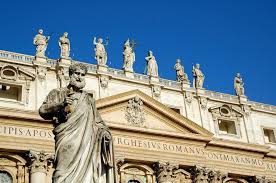On this July 18th, 1870, the First Vatican Council, at the impetus of Pope Pius IX, proclaimed the dogma of papal infallibility. Some were against defining the doctrine – including Cardinal Newman. Not that they were against this truth itself, but that defining it was inopportune, and perhaps even impossible. It seems the Holy Spirit thought otherwise, and we should be clear that the definition limits the application of infallibility to a very specified use of this charism, which belong to the papal office as the Vicar of Christ. Most of what the Pope and his Magisterium teaches is not infallible, even if it be authoritative. Here is the key text from the Constitution Pastor Aeternus from the Council:
Therefore, faithfully adhering to the tradition received from the beginning of the Christian faith, to the glory of God our savior, for the exaltation of the Catholic religion and for the salvation of the Christian people, with the approval of the Sacred Council, we teach and define as a divinely revealed dogma that when the Roman Pontiff speaks EX CATHEDRA, that is, when, in the exercise of his office as shepherd and teacher of all Christians, in virtue of his supreme apostolic authority, he defines a doctrine concerning faith or morals to be held by the whole Church, he possesses, by the divine assistance promised to him in blessed Peter, that infallibility which the divine Redeemer willed his Church to enjoy in defining doctrine concerning faith or morals. Therefore, such definitions of the Roman Pontiff are of themselves, and not by the consent of the Church, irreformable.
From this, we may draw four requirements for an infallible teaching:
- It must be on faith and morals, the proper matter of revealed doctrine, as necessary for salvation.
- It must be definitive, framed in a way that makes this clear.
- The Pope must be teaching as Pope, and clearly doing so, invoking in some way, at least implicitly, the authority proper to this office.
- The teaching must be promulgated to all the faithful, and to some particular group.
The dogma of infallibility puts to rest Protestant fears that the Pope is some sort of guru, whose every word and utterance must be held as a divine oracle. In previous eras – that is, prior to about fifty or so years ago – Popes were careful in their words, just in case their musings and opinions could be taken out of context.
A caveat, in this age of instantaneous media whereby one’s words are projected into every household, most Catholics were not aware of what Popes said or thought.
Food for thought, in today’s information-saturated age. Best to focus first and foremost on what has been definitively and infallibly taught through two millennia of Church teaching, so that we interpret with clarity whatever is put forward today.










